Financial zone now home to many global institutions
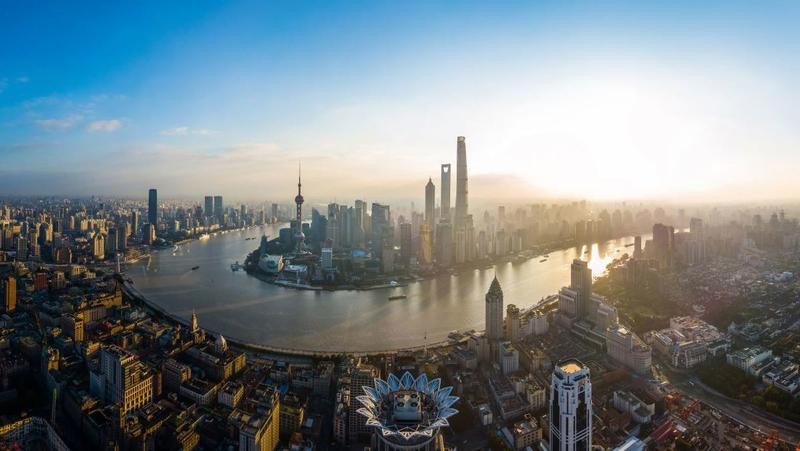 A morning view of the Huangpu River. (CHEN ZHONGQIU / FOR CHINA DAILY)
A morning view of the Huangpu River. (CHEN ZHONGQIU / FOR CHINA DAILY)
Groundbreaking progress on many fronts has been made in Pudong New Area in Shanghai, which is celebrating the 30th anniversary of its development and opening-up.
As an important gateway connecting domestic and international markets, the 1,210-square-kilometer area in the east of the city will, for many years to come, shoulder more responsibilities relating to China's deepened reform and opening-up.
President Xi Jinping said during an inspection visit to the area in 2010, when he was vice-president, that Pudong should play a key role in implementing national pilot plan policies.
On April 18, in a People's Daily article, Shanghai Party Secretary Li Qiang said Pudong should become a leader in China's efforts to drive economic globalization, adding that this is an irreversible global trend.
Since it was officially established in 2013, the China (Shanghai) Pilot Free Trade Zone, the first of its kind in the country, has laid the systematic groundwork for Pudong's opening-up and that of the entire nation. To date, more than 300 innovational policies have been promoted nationwide.
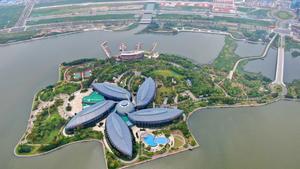 Lingang Special Area was included in the Shanghai Free Trade Zone in August last year. (XU CONGJUN / FOR CHINA DAILY)
Lingang Special Area was included in the Shanghai Free Trade Zone in August last year. (XU CONGJUN / FOR CHINA DAILY)
The negative list for foreign investment, introduced in the Shanghai FTZ in 2013, was expanded nationwide in late 2018. While there were 190 restricted items on the list in 2013, there were just 30 on the latest version revised in late July.
In August last year, Lingang Special Area was included in the Shanghai FTZ, marking the zone's second expansion based on President Xi's decision for the city's development, announced in 2018.
Zhao Xiaolei, director of the FTZ research institute at Shanghai University of Finance and Economics, said opening-up is "in the genes of Lingang", and in just one year, it has largely paved the way for freedom of investment, trade, capital, transportation and employment.
"While sticking to all-around opening-up, Lingang should implement effective 'dual circulation' strategies," he said.
"Industry leaders should play a bigger role to better integrate with regional industrial chains. Lingang, in general, should grow into an important gateway through which the Chinese economy will be better integrated into world economic globalization."
 New energy vehicles are parked in Lingang Free Trade Zone. (ZHANG HENGWEI / CHINA NEWS SERVICE)
New energy vehicles are parked in Lingang Free Trade Zone. (ZHANG HENGWEI / CHINA NEWS SERVICE)
Successful flotations
The finance industry in Pudong, which has witnessed many "firsts "over the past 30 years, has not only made it easier to develop the real economy, but has also served the country's reform and opening-up.
The technology-focused STAR Market, launched on the Shanghai Stock Exchange in July last year, has seen more than 185 companies successfully floated, with total financing for initial public offerings, or IPOs, topping 272 billion yuan (US$41 billion).
An IPO mechanism based on registration was first launched on the STAR Market, marking a major advance in A-share market reform. Companies not reporting profit or those with dual-class ownership-a type of stock offering in which companies issue shares that have differing rights-are allowed an IPO for the first time on the Nasdaq-like market.
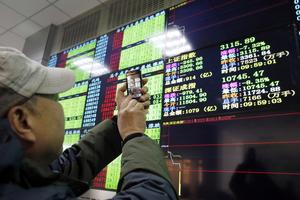 Share prices are displayed at the Shanghai Stock Exchange. (YI LIQIN / FOR CHINA DAILY)
Share prices are displayed at the Shanghai Stock Exchange. (YI LIQIN / FOR CHINA DAILY)
According to professional services provider EY, the Shanghai bourse, boosted by the STAR Market, overtook all exchanges worldwide in the first half of this year in terms of the number of IPOs and total financing value.
Yang Chao, deputy governor of Pudong, said that last year Shanghai also reported the world's largest trading volume in commodities futures and options.
At least 1,098 commercial banks and securities companies are registered in Pudong, along with 2,000 financial service providers.
More than 41 percent of foreign banks, 40 percent of overseas insurers and over 90 percent of foreign private equity companies registered with China's financial watchdogs have set up offices in the district. Nine of the world's 10 largest asset management companies also have a presence in Pudong.
A large number of leading global financial institutions with their China or regional headquarters in Pudong have benefited from local financial opening-up policies.
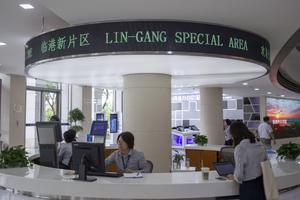 Staff members work at the Lingang Special Area service center. (LYU LIANG / FOR CHINA DAILY)
Staff members work at the Lingang Special Area service center. (LYU LIANG / FOR CHINA DAILY)
In 1995, Japanese lender Fuji Bank set up its office in the district, becoming the first foreign bank in China.
In November 2018, multinational bank and investment services company UBS was given approval by the China Securities Regulatory Commission to become the country's first foreign-controlled securities firm. Also at the beginning of this year, Allianz (China) Holding was unveiled as the nation's first wholly-owned foreign insurance holding company.
At the end of August, the world's largest asset management group, BlackRock Financial Management, became the first wholly foreign-owned mutual fund in China.
Despite global markets being rattled by the COVID-19 pandemic this year, Pudong still managed to attract US$4.69 billion in foreign investment in the first six months, a year-on-year rise of 46.1 percent.
 An exhibition in Shanghai marks the 30th anniversary of Pudong New Area. (GAO ERQIANG / CHINA DAILY)
An exhibition in Shanghai marks the 30th anniversary of Pudong New Area. (GAO ERQIANG / CHINA DAILY)
A total of 12 multinational companies set up their regional headquarters in the district during the first half of this year. Pudong is now home to the regional HQs of 344 multinationals, comprising just over 46 percent of the city's total.
In April, Volvo Construction Equipment said it was moving its Asia Pacific headquarters from Singapore to Pudong, which will be the company's largest regional base outside its global headquarters in Sweden. The newly announced Pudong facility will manage more than 50 percent of the company's global business.
Zhan Xu, vice-president of Volvo Construction Equipment China, said the move to Pudong was based on an improved investment environment and systematic innovation in the district, in addition to progress made by China to better its business environment in general.
Pudong's role in the domestic market is also important.
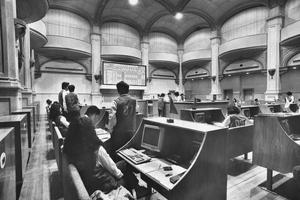 A view of the Shanghai Stock Exchange trading floor in 1991. (PHOTO / XINHUA)
A view of the Shanghai Stock Exchange trading floor in 1991. (PHOTO / XINHUA)
At a symposium in late August, President Xi said full support should be given to the area, as its successful innovative experiences are of strategic importance to the integrated development of the Yangtze River Delta region, which was elevated to national-strategy level in 2018.
According to Hang Yingwei, governor of Pudong New Area, integrated development of the Yangtze River Delta region depends to a large extent on the coordinated support of finance and technologies.
In view of this, in April last year, the local government in Pudong New Area and the Shanghai Stock Exchange jointly founded the Yangtze River Delta region capital market service center.
The center is now linked to more than 120 professional institutions in 28 cities in the region, with the aim of providing IPO, equity and debt financing services for more than 3,000 companies.
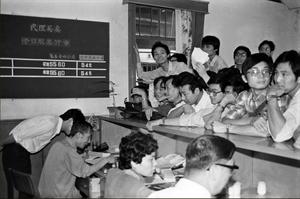 Investors line up to buy stocks in September 1986, when the Shanghai Stock Exchange reopened after the founding of New China in 1949. (MA JIANMING / FOR CHINA DAILY)
Investors line up to buy stocks in September 1986, when the Shanghai Stock Exchange reopened after the founding of New China in 1949. (MA JIANMING / FOR CHINA DAILY)
Economic dynamics
Weng Zuliang, Party chief of Pudong New Area, said "high-quality development" should be a key phrase for the district's development. The area's economic vibrancy, which reflects the nation's dynamic economic achievements, should be supported by high-end industries, new technologies and business models, he said.
According to the Pudong government's development plan, six key industrial clusters, each valued at more than 100 billion yuan, should be built by 2025, covering chip making, innovative drugs, aviation, new energy vehicles, smart manufacturing and big data.
A considerable effort toward achieving this goal has been made in Zhangjiang, an area of central Pudong focusing on biomedicine and major scientific equipment. In 2016, Zhangjiang was approved as China's first national-level comprehensive science center. A total of 24,000 companies, mainly specializing in integrated circuitry, biomedicine and artificial intelligence, are registered in Zhangjiang.
Weng said: "From day one, Pudong has shouldered a heavy responsibility to help carry out China's national strategies. Development of Pudong is never just about the district itself, but is also closely related to development of the whole country.
"Pudong should become a key link in China's new 'dual circulation' strategy in order to become more deeply integrated with world competition and cooperation."



